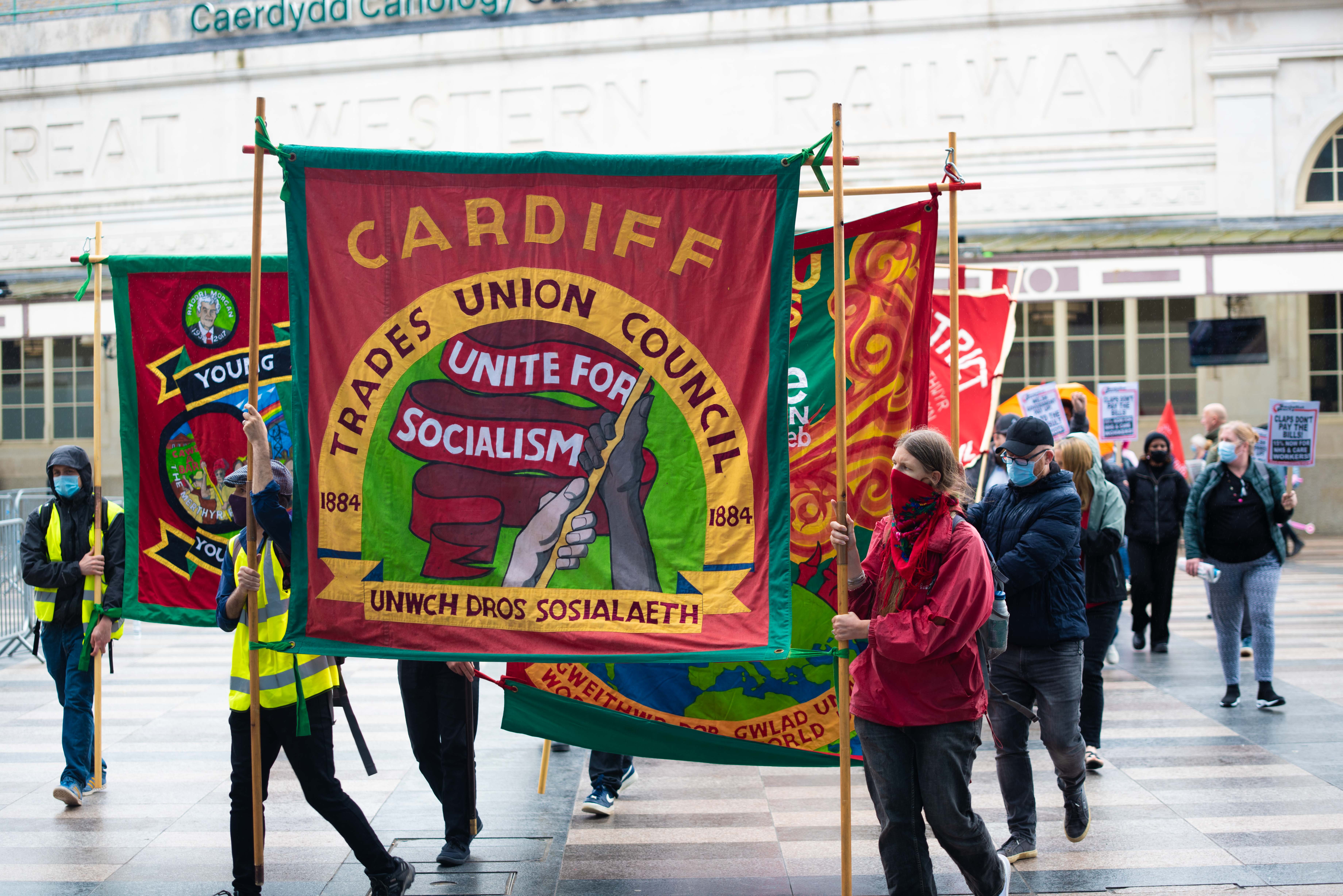
Social Partnership – Are Unions Getting Too Friendly With Welsh Government?
As unions launch a wave of strikes and ballots in response to real-terms pay cuts, the Social Partnership and Public Procurement Bill goes before the Senedd, promising a more progressive approach to industrial relations than that seen in England. In this analysis, Morgan Rhys Powell takes a critical look at partnership in a context of increasing employer aggression and class conflict.
Cover image by Mehek Seth
The labour movement has a major fight on its hands in the coming months.
Media commentators have declared a “summer of strikes” as multiple unions ballot their members for action, attempting to save workers’ hard-earned wages from being subsumed by inflation and employers’ hoarding of record profits. Widespread anger at the cost of living crisis could feed into this, with polls suggesting that popular perception of the recent RMT action is split, and that the British public might not be as militantly opposed to strikes as the Daily Mail would have you believe.
Yet this potential resurgence of workers’ collective action has emerged in difficult circumstances. The most recent figures show that union membership as a proportion of the UK workforce fell to a new low in 2021, sustaining the long-term trend of steep decline since 1979. Workers in the private sector continue to be the hardest to unionise, even while enduring some of the most ruthless working conditions. And the British state presses confidently on with its decades-long campaign to break the backs of unions through legislation, most recently by legally mandating scabbing. Even with signs of hope, the challenges confronting unions are enormous.
At first glance, the labour movement in Wales appears best placed to face these challenges. After years of lobbying and consultation, Wales TUC has seen significant progress on its “social partnership” agenda, with the Social Partnership and Procurement Bill brought before the Senedd in early June. This proposes an approach to industrial relations that is meant to look more like social democratic Scandinavia than Tory England. For the most enthusiastic, it might even explain why Wales was the only UK nation to see increasing numbers of workers joining unions in 2021, with 33,000 more signing up than in the previous year, though there is insufficient data to say this for certain.
What is social partnership?
Social partnership has become a watchword for Wales TUC in the last four years, first proposed in Mark Drakeford’s leadership manifesto and gradually put into practice in various public bodies. The concept is broad and ambiguous, but it generally refers to a relationship of compromise between unions, employers, and the state, often facilitated or even mandated by law, and sometimes involving union and employer input on government policy.
In the context of union weakness and historic lows in workers’ ability to win concessions through strike action, Wales TUC enthusiastically took up the idea, pouring resources into getting the Welsh Government to work “with unions and employers on an equal, tripartite basis to design and implement policies which impact workers”.
The new bill will create a Social Partnership Council of ministers, employers and worker representatives who will make recommendations on Welsh Government policy, specifically regarding the priorities set by public bodies and the use of private companies to deliver public services.
Beyond the bill’s somewhat vague detail, Wales TUC officials explain that social partnership is also a broader “way of working”, where unions gain an equal footing with employers in the contest for government attention.
But things are not as rosy as they seem. Early efforts at partnership have faced challenges, most notably when the Welsh Government chose not to tell unions that it intended to fine workers for being forced into work during the pandemic, or when it imposed a below inflation pay deal on Welsh NHS workers last year. The recent exclusion of education unions from discussion on planned changes to the school year does not bode well. And the approach as a whole has been derided by Swansea Trades Council.
With the labour movement possibly facing the fight of a generation, those of us who want to win that fight must now ask: does partnership help us do that?
A brief history
Social partnership is not a new idea. It emerged in post-war Austria, aiming to avoid industrial disruption as the nation rebuilt its economy. The resulting culture of compromise was strengthened by the Cold War, with its demonisation of any claims that workers and capital hold distinct interests.
The economic boom of the 1950s and ‘60s provided fertile conditions for variations of the approach to spread throughout Western Europe, increasing the capacity of capital to accommodate some improvements in workers’ conditions.
In ’60s Britain, steady wages, job security and a tight labour market built on the vestiges of colonialism had created a confident and industrially powerful layer of the working class, rooted in manual work, willing to take the risks of strike action to assert its interests.
Both Labour and Tory governments sought to use partnership as a means of containing that power, specifically in order to win unions’ consent for capping wage increases when capital felt that was necessary.
Close relations were built between TUC and government officials, with union leaders gradually coming to accept wage restraint even while struggles for better pay and conditions raged on the shop floor. By 1968, a government-commissioned report claimed that 95% of strike action was unofficial, taking place without the approval of unions, led by networks of workplace organisers who were exasperated by the compliant and ineffective attitudes of their leadership.
When governments sought to crack down on those strikes by introducing punitive legislation, it was mass demonstrations of anger by rank-and-file trade unionists which fought off those efforts, not negotiations over drinks with ministers. When efforts to advance the cause of equal pay for women stalled at government level, the strike action of women workers in places like Dagenham’s Ford factory forced progress outside of the channels built by partnership. And when unscrupulous employers sought to take advantage of new migrant workers, resistance often received insufficient support from unions, such as in the Grunwick strike, whose leaders resorted to going on hunger strike outside the TUC’s headquarters demanding basic solidarity.
Partnership expanded after 1974 as the Labour government intensified efforts to enforce income caps. This saw multiple union victories, including important legal protections for trade unionists at work, but the decade’s subsequent crises strengthened the state’s resolve to reign in worker militancy and, lacking sufficiently coordinated resistance from unions, paved the way for the Thatcherite onslaught which we are still living with today.
The working class of this period demonstrated the massive power that it could wield when it was confident and organised. But union leaders failed to channel that into a transformative industrial strategy – not least because they were enamoured with the prospect of influencing policy in the backrooms of Parliament while opportunities for organising went to waste, ultimately snatching defeat from the jaws of victory.
Partnership for who?
This history introduces us to one of the most stark perils of partnership: that it cleaves union leaders away from the realities of work and from the movement which they claim to represent.
Arguably, this risk could be mitigated by demanding that those chosen to represent workers are elected and held to account through procedures which reach the rank-and-file. Will such checks and balances be put in place in Wales? There are no indications of any such processes in Wales TUC’s reams of documents on partnership, whose audience largely seems to be policy-makers rather than workers.
And such an approach may be unworkable anyway, because it is the First Minister who, in the Welsh Government’s bill, ultimately chooses who represents workers on the Social Partnership Council. The TUC will make nominations, but without any means of enforcing those.
There is, in any case, a more fundamental problem. When partnership is offered to union leaders – rather than being demanded, won and enforced through workers’ collective action – it isn’t hard to guess who sets the terms of engagement.
Current European cases which are held up as gold-standard examples of partnership actually exist in a state of constant precarity, able to be unilaterally dropped on the whim of employers or governments. Such threats have been made in Austria, the birthplace of partnership, and Ireland saw its longstanding system abandoned when employers decided that it was too much of an inconvenience after the 2008 crisis, flat-out ignoring unions’ objections.
Will Welsh partnership be more resilient when it inevitably faces challenges? The Welsh Government is not a socialist government. It does not advance democratic control of production. When faced with the immense power of international capital it is likely to quickly buckle under pressure, appeasing employers who might otherwise threaten to take their business elsewhere.
We have already seen indications of this with the rolling out of the red carpet for Amazon and the refusal to impose Welsh language standards on the private sector. And then there is the precarity of devolution itself, with the only thing stopping Westminster from scrapping existing Welsh trade union legislation being a lack of parliamentary time.
Without the threat of enforcement from an organised and coordinated workforce, partnership will be no more resilient here than it was in Ireland.
Partnership for what?
Faced with employers who are willing to impose increasingly precarious conditions on workers while raking in profit, does partnership help the workers’ movement rebuild its industrial base and fight back?
Ultimately, the ability of the working class to pursue its interests doesn’t come from appeals to the moral sensibilities of bosses or from making convincing arguments at the negotiating table. It comes from our power to disrupt the production of profit en masse, made more effective by coordinated industrial strategy.
In Sweden, Finland, Denmark and elsewhere, partnership has served to limit that class power by enforcing “peace obligations” which make strikes illegal in workplaces with recognition agreements. In the Netherlands, improvements for the most precarious workers have been won in spite of partnership, through cleaners’ militant campaigns for fair pay which upended standard Dutch approaches to workplace conflict.
While the Welsh bill doesn’t go as far as restricting strikes, it also doesn’t take effective steps to build workers’ power on the ground, offering no guarantees of union access to non-unionised workplaces and making no concrete effort to increase the chances of union recognition in the private sector.
Perhaps more worrying however is the potential of the bill to allow non-union bodies to claim to represent workers. Subsection 16.1 states that public bodies with no recognised union can, instead, consult with “other representatives of its staff” when setting priorities. This reads as opening the door to “yellow unionism”, where staff forums which are run by employers play the part of unions while parroting the bosses’ lines.
When conditions call for a strategy of organising and leverage without shortcuts, partnership does nothing to support that, and even risks undermining any such efforts.
Concessions not compromise
Despite the pitfalls outlined above, there is a risk of overstating the significance of partnership in Wales. The Welsh bill is weak compared to many of its European equivalents. It emerges from conditions of government risk-aversion and profound union decline, and it could ultimately have little effect on efforts at union renewal.
The TUC also does not dictate the strategy of the labour movement – Unite, for example, is leading the way with a renewed approach in England, turning to workplace organising and increasingly standing up to the Labour Party under the leadership of Sharon Graham. Independent unions continue to build workers’ confidence in the most difficult conditions, despite efforts to undermine them. And some Welsh unions remain willing to challenge the ongoing imposition of real-terms pay cuts by the Welsh Government.
It is nonetheless frustrating that, when the need for an ambitious and aggressive industrial strategy is most urgent, our movement’s resources risk being taken up on class compromise rather than confrontation. The cost of living crisis is a nightmare on our doorstep, but it is equally an opportunity to win substantial concessions from the employing class if workers respond to it with action.
After failing to fend off decades of attack, the workers’ movement looks potentially ready to meet employers’ aggression in kind. Our task is to get our unions to do that as effectively as possible.
*Morgan Rhys Powell is a PhD student and UCU activist, researching workers’ organising in the non-unionised private sector.



2 Comments
Comments are closed.